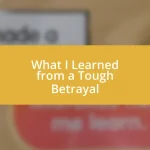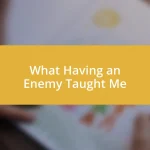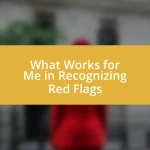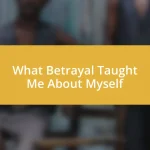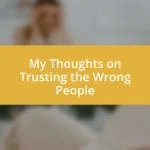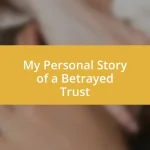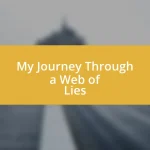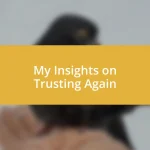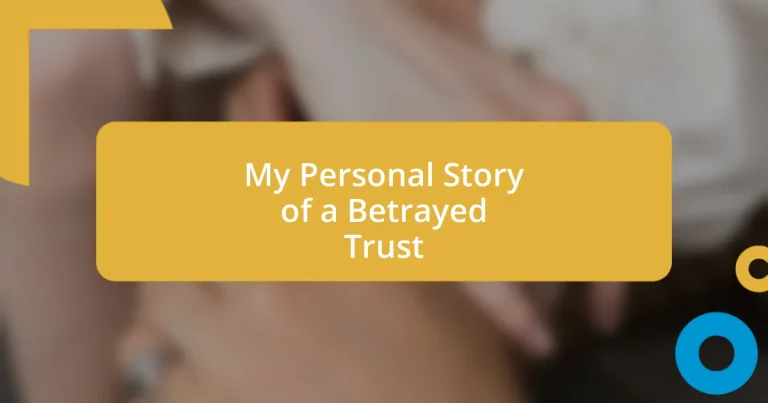Key takeaways:
- Betrayal fundamentally challenges trust in relationships, leading to emotions like anger and sadness, which can teach resilience and self-worth.
- Recognizing signs of betrayal includes observing changes in communication and trusting one’s gut feelings about discomfort in interactions.
- Rebuilding trust is a gradual process that involves transparent communication, patience, and self-reflection on personal boundaries and trust patterns.
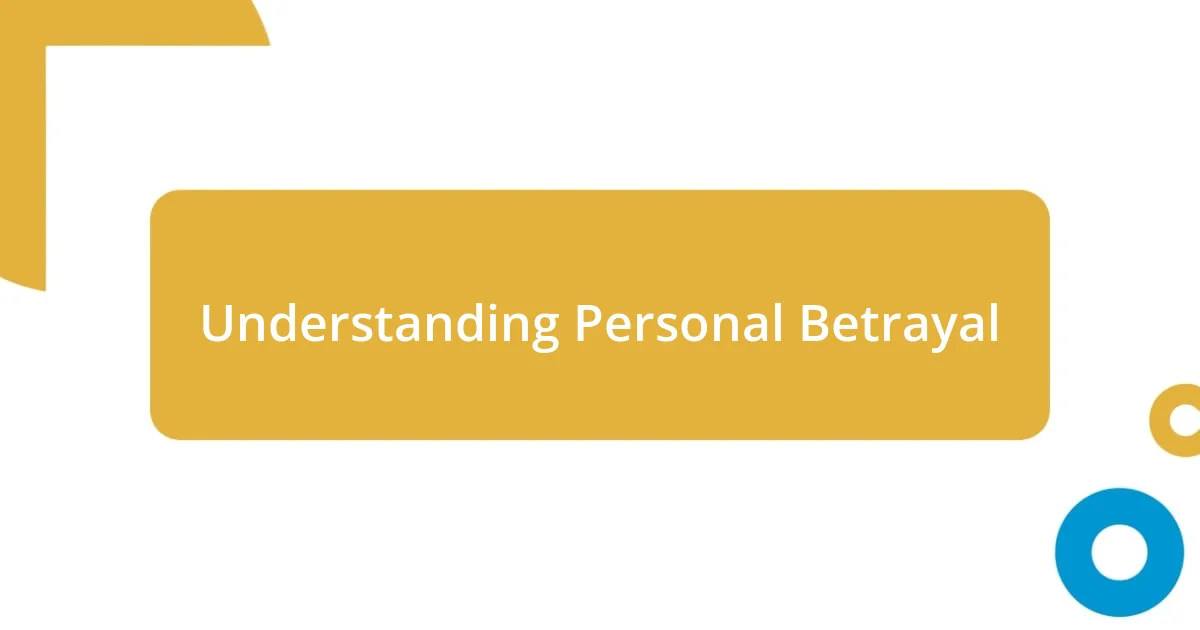
Understanding Personal Betrayal
Betrayal is a deeply personal experience, one that often shakes the very foundation of trust we build with others. I remember when a close friend shared my secrets without hesitation. It left me wondering, how could someone I confided in turn against me so easily?
Understanding personal betrayal means recognizing that it cuts to the core of our relationships. It’s not just about the act itself but the emotions that follow—anger, sadness, confusion. In those moments, I felt as if a part of me had been stolen, leading me to question whether my judgment about people was deeply flawed.
This situation often leads us to ask ourselves tough questions. Can we truly trust anyone again? I’ve grappled with this notion, and over time, I’ve realized that while the scars of betrayal linger, they can also teach us invaluable lessons about resilience and self-worth. It’s a hard lesson, but one that encourages us to reassess who we allow into our lives.
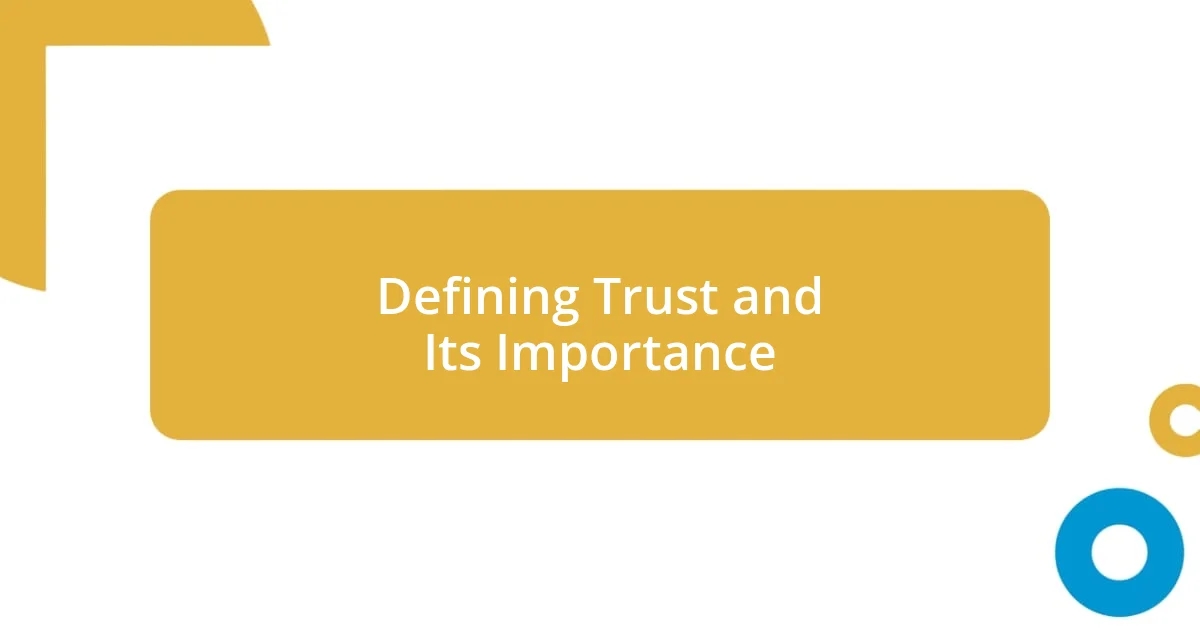
Defining Trust and Its Importance
Trust is the foundation of any meaningful relationship, shaping our interactions and connections with others. To me, trust signifies vulnerability; it’s about allowing someone a glimpse into our true selves. When I decided to tell my friend my deepest fears, it was an act of immense faith. Yet, betrayal came like a thief in the night, shattering that trust and leaving me feeling exposed and uncertain.
Here are a few key points that encapsulate the importance of trust:
– Emotional Safety: Trust creates a secure environment, allowing individuals to express their thoughts and feelings without fear of judgment.
– Mutual Respect: When trust exists, there’s a shared understanding that each person values and respects the other’s feelings and boundaries.
– Resilient Relationships: Trust fosters perseverance within relationships, enabling them to weather the storms of disagreement and conflict.
– Open Communication: With trust, communication becomes more transparent, allowing for honest conversations that can strengthen bonds.
– Stronger Connection: Ultimately, trust nurtures deeper connections, making relationships more fulfilling and rewarding.
Reflecting on these points helps me appreciate just how vital trust is in every aspect of our lives. Without it, our bonds can easily become fragile, leaving us to navigate a landscape filled with doubt and fear.
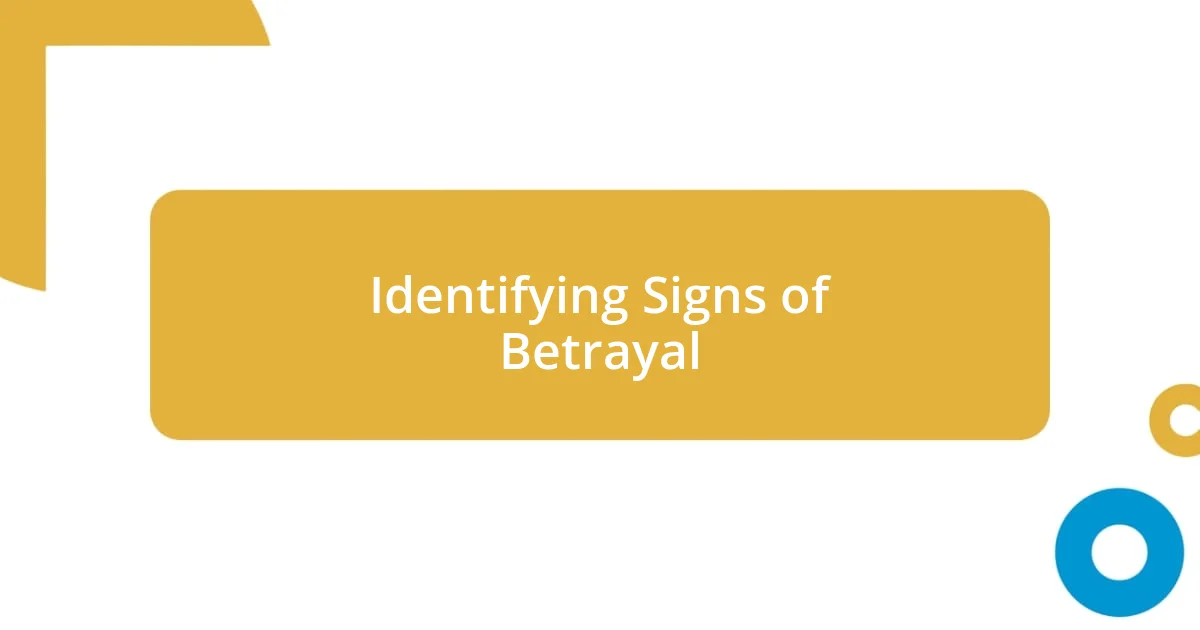
Identifying Signs of Betrayal
Identifying the signs of betrayal isn’t always straightforward; often, it’s a gradual realization. For instance, I noticed my friend started steering conversations away from my achievements, always pivoting to their own stories. It felt subtle at first, but over time, it developed into a pattern that made me question our friendship’s sincerity. Have you ever felt someone wasn’t genuinely happy for your success? Those instincts can be a critical red flag.
Another indication I encountered involved sudden changes in communication. Initially, we shared everything; then, I sensed a shift where my friend became evasive and secretive, guarding their phone or quickly changing the subject when I asked about their day. This behavior is similar to a line of poetry that resonates deeply: “The silence speaks when words can’t convey.” It can feel unsettling when someone you trust pulls away emotionally.
Lastly, I learned to pay attention to my gut feelings. There were moments when I would feel a knot in my stomach as I interacted with this person, experiencing a vague sense of discomfort. Trust your intuition; it often picks up on discrepancies others might overlook. When I finally confronted my friend, I didn’t just seek answers; I sought closure for the inner turmoil I had felt for so long.
| Signs of Betrayal | Possible Indicators |
|---|---|
| Subtle Negativity | Consistent changes in tone or focus during conversations |
| Avoidance of Personal Topics | A shift towards secrecy and personal distance |
| Intuition | Physical discomfort or gut feelings during interactions |
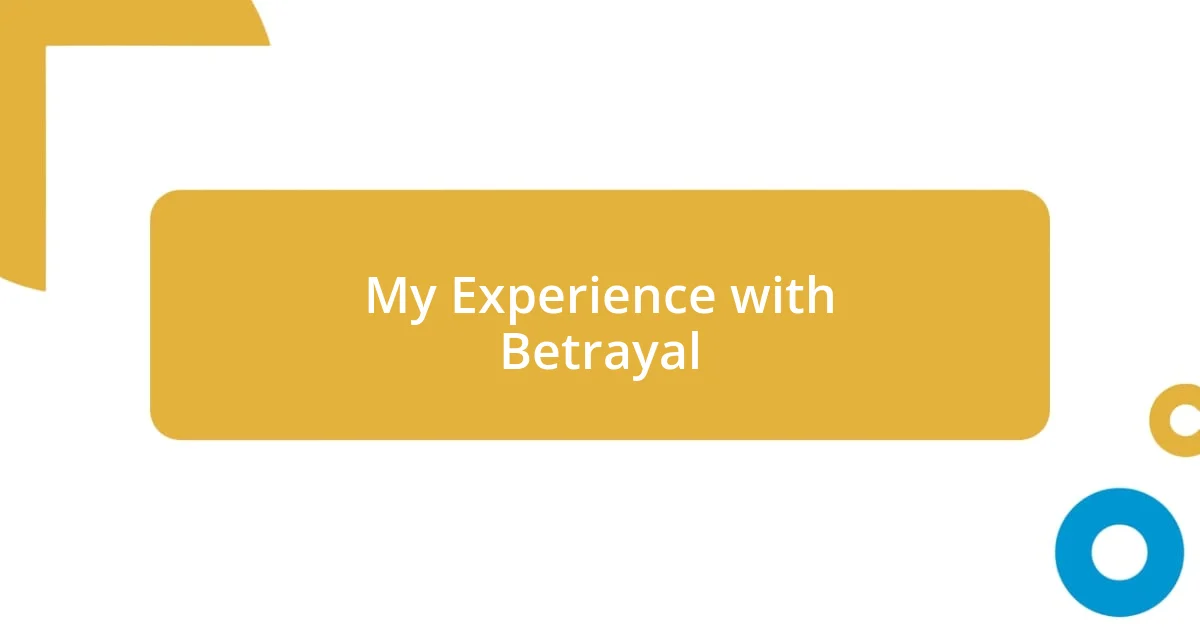
My Experience with Betrayal
Reflecting on my experience with betrayal brings a surge of emotions, even now. I remember feeling as if the ground had slipped away beneath my feet when I discovered my friend had been sharing my vulnerabilities with others. It was a moment that felt like a cruel awakening. I had entrusted them with my secrets, only to watch them turn into fodder for gossip. Has there ever been a time when you felt exposed because of someone you trusted? I can tell you—it’s a hollow feeling that lingers long after.
There were days that stretched into weeks when I couldn’t shake the disbelief and anger. I replayed our conversations, searching for clues I might have missed. I had believed in the strength of our bond, but suddenly, it felt like a mirage. The weight of feeling betrayed left me questioning my own judgment. I wonder if you’ve ever had that moment of clarity, where the truth hits you like a ton of bricks. For me, that moment revealed a painful truth about not just my friend but also myself—I had underestimated where trust can falter.
As time passed, I began to understand that betrayal was not merely a reflection of my friend’s choices but also a learning curve for me. I learned about the importance of setting boundaries and recognizing my own self-worth. Perhaps you’ve experienced the same? It’s remarkable how these painful events can shape our understanding of relationships. I emerged from that experience changed; now, I appreciate the value of trust while also remaining aware of the fragility that can exist within it.
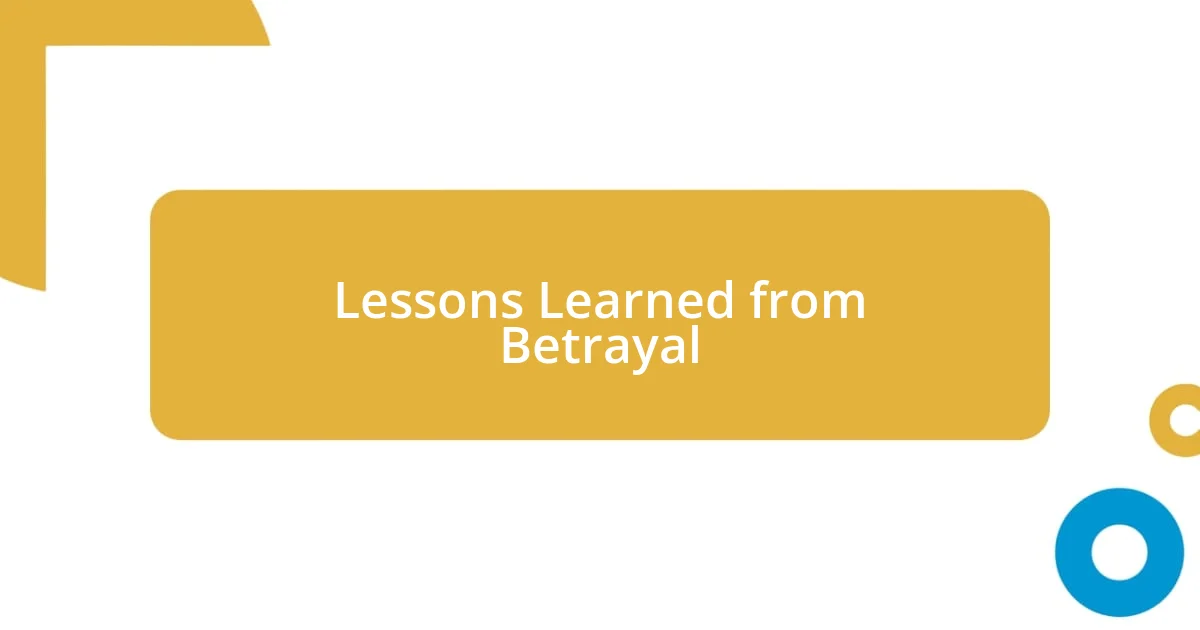
Lessons Learned from Betrayal
When I think about the lessons learned from betrayal, one standout realization is the importance of discerning whom to trust. After my experience, I actively reevaluated my relationships. There’s a sense of empowerment that comes with being selective about who gets a peek into your heart. Have you ever thought about how protective you should be with your inner circle? I now believe it’s essential to nurture only those connections that truly uplift you.
Another lesson was recognizing the value of my emotions. I used to dismiss my feelings as overreactions, but betrayal taught me that my emotional responses are valid and meaningful. I vividly remember the ache in my chest when I found out the truth; it made me realize how deeply I cared for this friendship. Have you ever felt such a profound sense of loss? Embracing those emotions, rather than burying them, ultimately helped me heal and grow stronger.
Lastly, I discovered the power of forgiveness—not just for the other person, but for myself too. It was a long journey, filled with anger and resentment, but I learned that holding onto that negativity was only weighing me down. The moment I decided to forgive—essentially letting go—I felt an overwhelming sense of relief. I wonder if you’ve experienced that liberating feeling? It’s an important step that can transform how you view relationships and yourself moving forward.
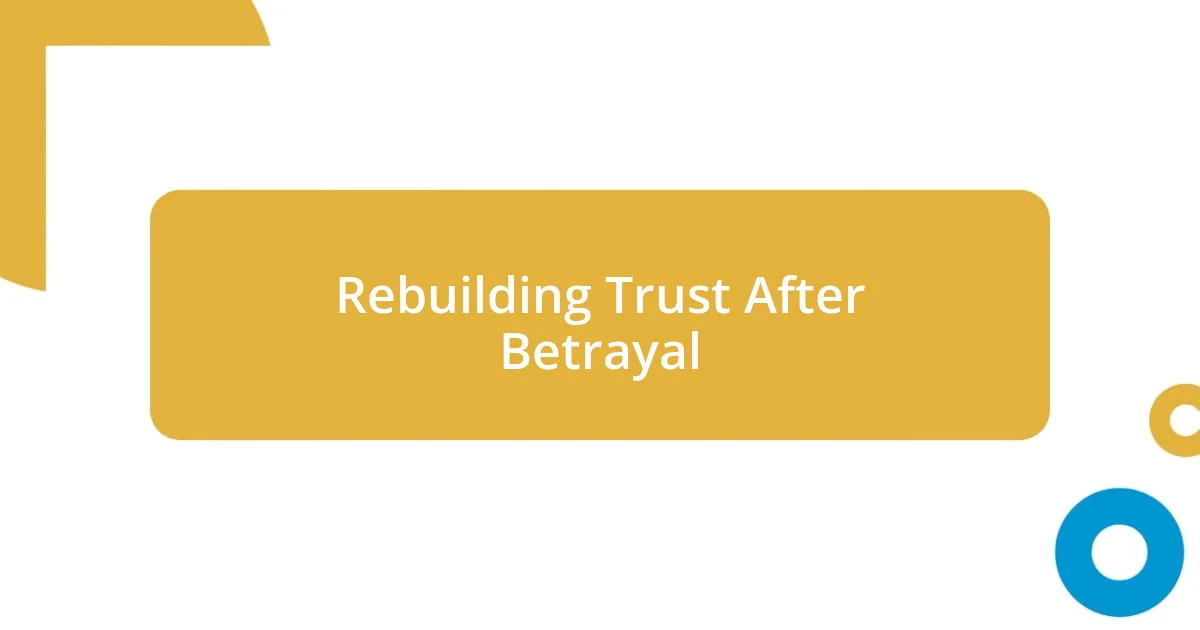
Rebuilding Trust After Betrayal
Rebuilding trust after betrayal is truly a delicate journey. I once found myself navigating this emotional terrain with someone I deeply cared for. To start the process, I opened up about my feelings, sharing my hurt and disappointment. Have you ever found that transparency can be the first step toward healing? For me, honestly naming my emotions allowed us to confront the elephant in the room, rather than pretend everything was fine.
Another crucial aspect I realized was the need for patience. Trust isn’t rebuilt overnight; it takes consistent efforts and small actions over time. I remember giving my friend a chance to prove themselves again—instead of rushing back into old habits, we gradually tested the waters. How often do you find yourself wanting immediate resolution? There was something enlightening about taking baby steps, allowing each positive interaction to stitch together the frayed fabric of our relationship again.
Lastly, I learned that rebuilding trust also involves self-reflection. I took the time to examine what led me to trust so easily in the first place. Did I overlook certain red flags? I found that doing this not only helped me understand my own patterns but also made me more resilient. This introspection has often led me to ask—how can we secure our hearts while still staying open to connections? The answers weren’t always easy, but embracing this complex mix of vulnerability and discernment has truly reshaped how I approach trust today.
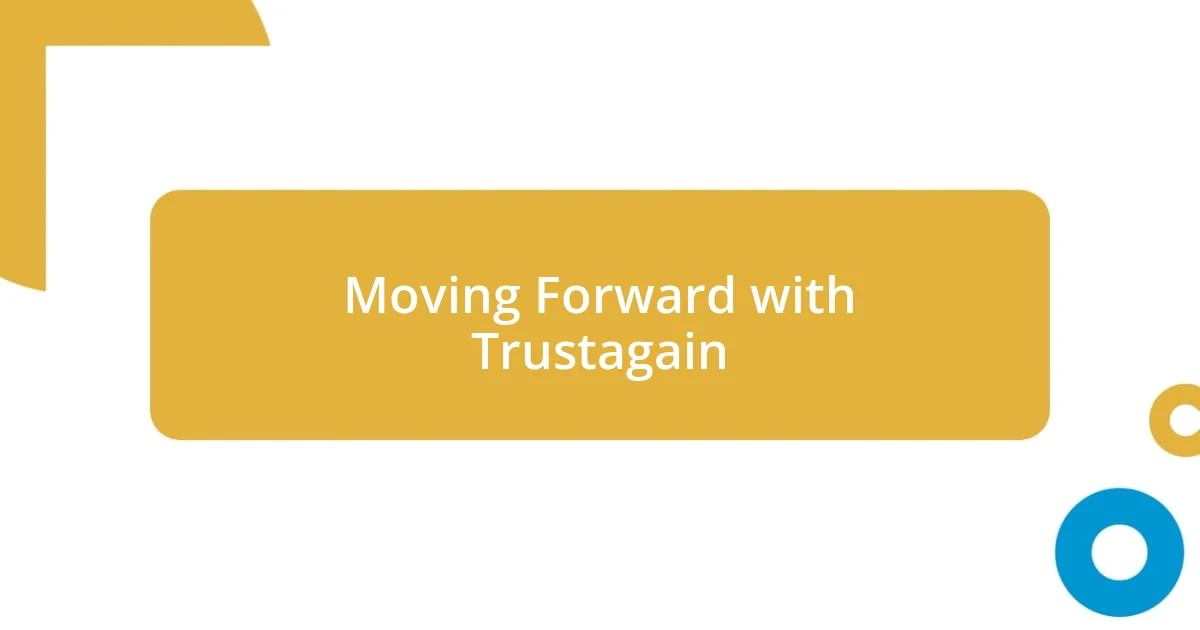
Moving Forward with Trustagain
In my journey of moving forward with trust, I’ve discovered the necessity of giving myself grace. I remember sitting alone one night, contemplating why I could still feel tethered to past betrayals. It hit me that it was okay to have scars from those experiences, but I didn’t want them to dictate my future. Have you ever felt caught between healing and fear? Letting go of that fear was a turning point for me.
Building trust again isn’t just about others; it’s about reclaiming my own capacity to trust myself. One day while journaling, I reflected on past decisions, recognizing that I had often overridden my instincts for the sake of others. This revelation opened the door to a new practice: I began to check in with myself first. It’s a simple yet powerful shift. How often do we tune into our own feelings before considering someone else’s needs? For me, that internal dialogue became foundational in rebuilding not just trust with others, but also within myself.
Ultimately, I’ve realized that moving forward with trust requires not just patience, but also an openness to new experiences. I recall attending a gathering after my betrayal, feeling apprehensive yet determined to engage. As I connected with new faces, I felt a spark of hope. It reminded me that every new relationship is an opportunity to redefine boundaries and expectations. Have you ever found strength in vulnerability when meeting new people? Trust can flourish again, but it often begins with a brave step into the unknown.
